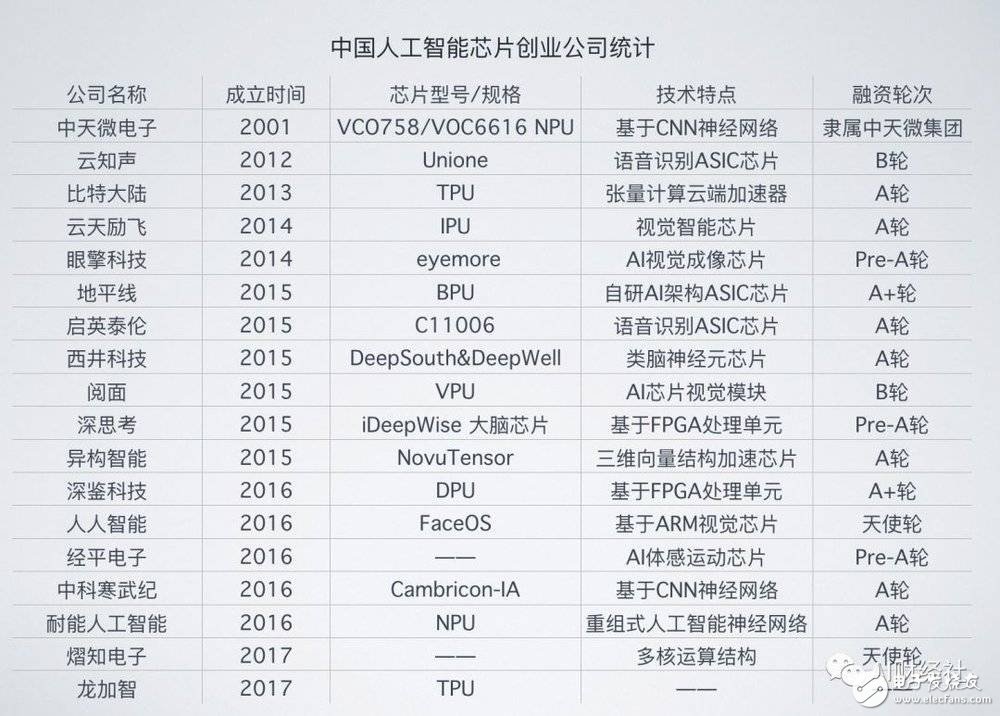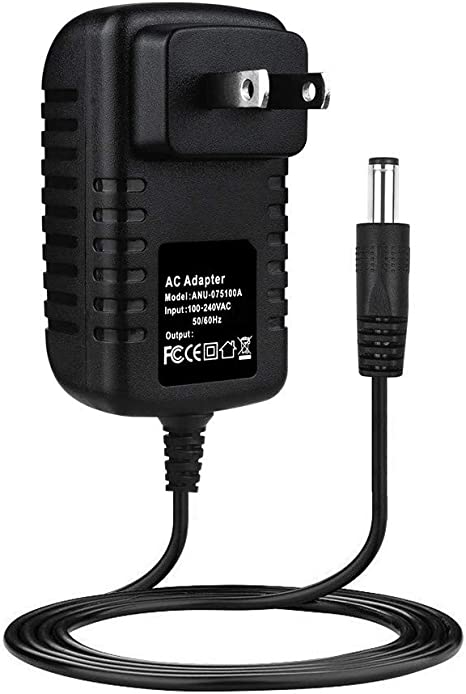The "soft" bonus security cake stock in the AI ​​era is limited
It is an indisputable fact that the self-sufficiency rate of chips in the Chinese market is low. The AI ​​chip is the most popular player. It seems that the opportunity for the Chinese core to overtake the car is finally coming, the protagonist is the artificial intelligence chip. Chinese AI chips will enter the security field, and no one is driving too far. Everyone wants to cut the security cake.
Deep learning technology is like a powerful stimulant, which makes the middle-aged semiconductor industry boil all over the world – it can increase the performance of existing chips by 10,000 times. Practitioners who are experiencing the “Moore's Law Failure†crisis are overjoyed and finally fascinated by deep learning.
What followed was the rush of the followers, who were ambitious and armed with cutting-edge algorithms, and vowed to be the subversives of the traditional semiconductor industry... to excite capital and the market.
It is rumored that in the second half of 2017, in the world's largest wafer foundry, TSMC, more than 30 artificial intelligence chips have been accumulated on the busy assembly line waiting for the offline release. As a small-scale trial production before the chip is officially mass-produced, the tape-splitting means that the chip is getting closer and closer to the ground.
"Soft" bonus in the AI ​​eraChina is the world's largest electronics manufacturer, but the chip has always been a heart disease for practitioners.
Although the Chinese market consumes nearly one-third of the world's chips, the low self-sufficiency rate of chips is an indisputable fact. The industry has long said that "China imports more chips than oil."
"This number is about 10%." Mo Dakang, a senior expert in the chip industry, said of the self-sufficiency rate of Chinese chips. "The number given by some institutions is 17%, but this is the chip that Intel and Samsung produce in China." Calculated."
Demand has spawned the market. Since the 1990s, a number of Chinese chip companies such as Huawei HiSilicon, Spreadtrum, and Zhongxingwei have emerged, but in the global market, this is far from enough. Until recently, artificial intelligence technology led by deep learning has come to the fore.
Relying on the massive data of China's demographic dividend, capital blessing, talents and huge market demand make China the most potential player in the era of artificial intelligence. At the same time, the government is determined to achieve the "artificial intelligence power" eagerness, artificial intelligence chips are listed as one of the eight key technologies.
All factors are improving. It seems that the opportunity of overtaking the Chinese core is coming. The protagonist is an artificial intelligence chip. It is also known as deep learning chip, neuron chip, mainly refers to a special type of chip designed for deep learning characteristics and needs.

According to the statistics of Xiaobian, there are 18 entrepreneurial scale companies with artificial intelligence chips as the core. The establishment time is usually 1 year to 2 years. The financing rounds are concentrated in the A round and earlier, focusing on the smart and visual fields.
Among the group of highly challenging artificial intelligence chip entrepreneurs, the Chinese Academy of Sciences Cambrian is the most dazzling one: has won the Huawei Kirin 970 chip cooperation order - implanted its artificial intelligence chip design patent into the Kirin 970 chip , for Huawei Mate10, glory V10 and other flagship mobile phones to accelerate. According to industry sources, the shipment of this chip will reach 30 million.
"The company is as its name." Zhongke Cambrian relied on the "national team" to create, in which Chen Yunxi and Chen Tianshi were the founders. Chen Yunqi went to middle school at the age of 9 and entered the junior college class at the age of 14 at the age of 14. He is a typical "genius boy." His brother Chen Tianshi also basically followed his brother's growth path.
"I have been working as a chip since I graduated. My brother has been doing algorithms - chip plus algorithm, just born the 'Cambrian' artificial intelligence chip." Chen Yunxi said. The genius who was selected as the "Best Innovator of the World" in the MIT Technology Review in 2015 is amazing: "To increase the computational efficiency of artificial intelligence chips by 10,000 times and reduce power consumption by 10,000 times."
This is a huge impact for the semiconductor industry, which has been operating under Moore's Law for nearly 70 years! In the past, the chip's iteration cycle was 18 months, and the performance of each iteration was doubled. Now, the soft skill of "algorithm" is like the power of Jiuyang, to break the iron law of hardware. It is precisely because of this, in the artificial intelligence chip startup team, most of the leaders are artificial intelligence research scholars or partial algorithmic talents, and did not follow the tradition of the chip industry - hardware class.
As early as 2015, when Intel rushed $16.7 billion to acquire programmable chip maker Altera, investment bank analyst Tony gave an investment opinion: "VCs are facing such chip entrepreneurs - they are not aware that they are engaged Software work, without software knowledge, should be quickly evacuated." Programmable chip (FPGA) has become a stepping stone for chip makers to enter AI.
In the following year, Intel increased its chips and opened up a strong strategy of “buy, buy and buyâ€. The representative acquisitions included the acquisition of artificial intelligence chip startup Nervana for $350 million and the acquisition of computer vision chip Movidius for $400 million. $15.3 billion acquisition of autonomous driving provider Mobileye and others. The layout of large enterprises has accelerated the pace of the chasing people.
Also in this year, China's artificial intelligence chip industry ushered in the entry of Yu Kai, a software algorithm.
In November 2015, Yu Kai, the former dean of Baidu Research Institute, resigned and founded the horizon (formerly “Horizon Robotâ€). At that time, artificial intelligence chips were still a word that most Chinese practitioners couldn't figure out. "This is a very far-sighted thing. Because you have seen things that others have not seen yet." Yu Kai said.
The labels of traditional semiconductor practitioners such as “low-key introversion†and “inappropriate speech†were torn off one by one. Instead, they are the new generation of the Internet's quintessence. They bring their own "spokesperson" attributes, emphasizing faster iterations and eloquently telling the steep performance improvement curve on the PPT.
At the beginning of 2017, after two years of hard work, the horizon received Intel investment; at the end of the year, its first dedicated artificial intelligence chip landed. "We are undoubtedly the fastest in this field, no second." Yu Kai said excitedly to the reporter.
In November 2017, artificial intelligence unicorn company Shang Tang Technology announced the introduction of Qualcomm's strategic investment. The chip giant said that it is the advantage of Shang Tang in machine learning models and algorithms. Earlier, the two companies had reached a cooperation on mobile phones and IoT artificial intelligence chips.
In December 2017, the artificial intelligence chip startup team, ThinkForce, was born and announced the completion of the 450 million A round of financing, which became the largest amount of financing for the chip startup team. In the background of its eye-catching investors – Yitu Technology, Yunfeng Fund, Sequoia Capital, and Gaochun Capital, Computer Vision Company ranked first in terms of technology. Some insiders pointed out that the team had been hatched in the early days of the company.
Founded in 2012, Yunzhisheng, which provided technical solutions for speech recognition and voice interaction, also joined the battle. Its first chip that integrates artificial intelligence algorithms will be streamed this year. Dr. Li Yuhan, co-founder of Yunzhisheng, told reporters that as early as 2014, the company had the idea of ​​making chips. "Because smart homes are not the same as mobile phones, they can solve problems without pure software."
Of course, in addition to a number of teams with algorithmic core strength, there are artificial intelligence chip companies with "hard" backgrounds. Shen Jian Technology, which has received much attention due to the investment of chip giants such as Samsung, Xilinx and MediaTek, was born out of the electronics department of Tsinghua University. Its CEO Yao Wei is a 90-year-old from 2011. During his undergraduate studies, he has published several related papers and is also the chairman of the Student Association of Tsinghua Electronics.
In 2015, Yao graduated from undergraduate degree. One year later, Shenjian Technology was established. “Han Song, one of our co-founders, turned to the direction of the algorithm during the Ph.D. research process.†Yao Wei talked about the team background. “It’s not possible to do artificial intelligence chips with pure hardware background. We are in machine learning, SLAM algorithm (real-time positioning). Long-term research has been done on aspects such as map construction)."
Founded in San Diego, USA in 2014, the company's choice of energy-resistant technology in Zhuhai, China, two years later also firmly believes in the "hardware engineer" culture. Founder Liu Juncheng worked in the R&D center of giant companies such as Samsung and Qualcomm. The founding team graduated from the electronic engineering department of the world famous universities and has more than 10 years of experience in the chip industry. In November 2017, Nineng Technology received a tens of millions of dollars in Series A financing from Alibaba, Sequoia and Qualcomm.

15v wall charger,15 Watt Power Supply,15v ac dc adapter,AC Wall Charger Power Adapter,AC/DC Charger Power Supply Switching Adapter,DC 15V Global AC / DC Adapter,15VDC Power Supply Cord Cable Wall Charger,15VDC800 Charger PSU
Shenzhen Waweis Technology Co., Ltd. , https://www.laptopsasdapter.com